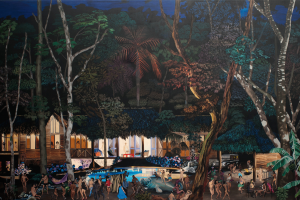
“Scene 1. Outdoor, daylight. High-angle shot,” she orders mentally.
The impossibly blue spotless sky of the tropic is spattered by a flock of birds, reminding the woman that time still goes by. She absents herself from the world while imagining, and she has been fantasizing for some time now about a curious camera filming her above the sea. For moments, she plays letting go of the top-piece of the bathing suit that swims in her hand. “I bet you can’t snatch it!”—she cries daringly, making her breasts move from side to side under the smooth wave. She laughs and offers them to the air and the sun. She imagines she’s an alga. Veronica is a floating sheet, a portion of matter extended on top of the water surface, at the bottom of the earth’s atmosphere. The dehydration signs on the skin indicate it is a good time to get back to the shore. Fortunately, there are few people on the beach.
Panting and smiling, she lays herself on the warm sand. She contemplates the murmur, listens to the sway. She lies on her back and looks up to the sky again. She breathes in the sun, savors the salt, feels the soil. Then, Veronica closes her eyes and gives in to the full experience of everything that surrounds her: she is aware of being at the alchemical junction of the four elements of nature. There, freed from clothing, friction directly onto skin, she feels the weight of being a body in the world: huge and tiny at once—a full-brush-body for painting the existence. She lets the air penetrate her orifices, brim over her lungs, infuse her blood with salt; then exhales vigorously, imbuing the world with her breath. Stuck to the sand, she hears footsteps, fleeting fragments of conversations. Veronica is aware of being crossed in the passing strip of the bathers, who surely stare at her—she thinks—with strangeness or greed. She will observe them in turn, in a while, when she strolls along the bay in search of a cold beer. She remembers Nat’s words: «Only poetry shall pull down your panties.» “And the sea,” she says to herself, as she feels the foam of a wave lick the brink of her feet.
The wind softly blowing over her hairs and skin, patiently patting her dry, leaving a few drops to glide freely across the goose-bumped surface. She feels the sun kissing her pores and the murmur whisper in her ears lovers’ secrets from other shores. The sea insists on enticing her legs that, by now, have begun to tan. The sand receives her tender and firm, concave and convex. Veronica feels her lust for the world boil. She is aroused by knowing herself so vast and indeterminately caressed and corresponds by rubbing herself against the soil and the water. At first, the movement is almost unnoticeable, but soon the body gains ground over consciousness. Emancipated, it digs and clings, slides and arches; she turns, moans and licks sand off her lips.
The frame will feature a smiling woman playing to be free on a seashore—her skin covered in some kind of alabaster dust. «Impudent Veronica. (On the Birth of Love and Spiritual Beauty as a Driving Force of Life),» will appear next as title.













